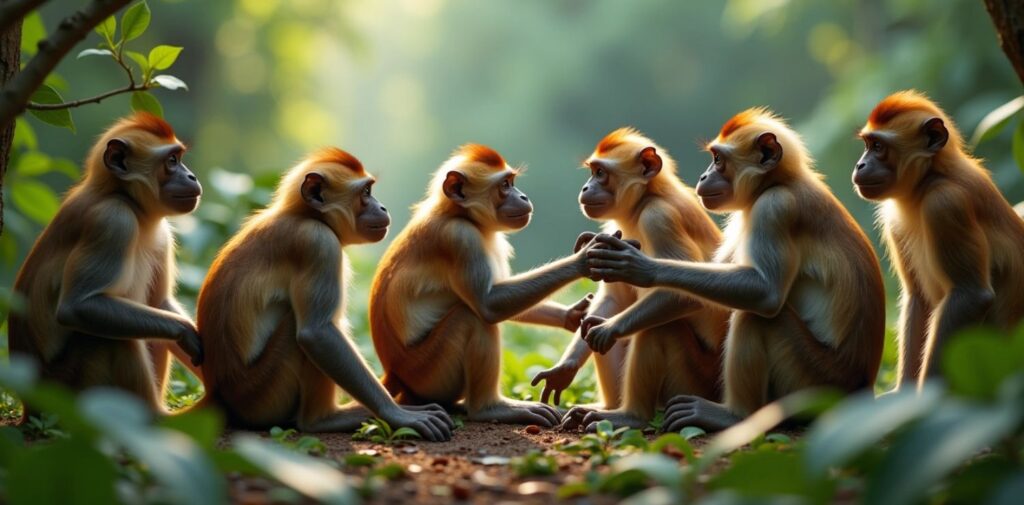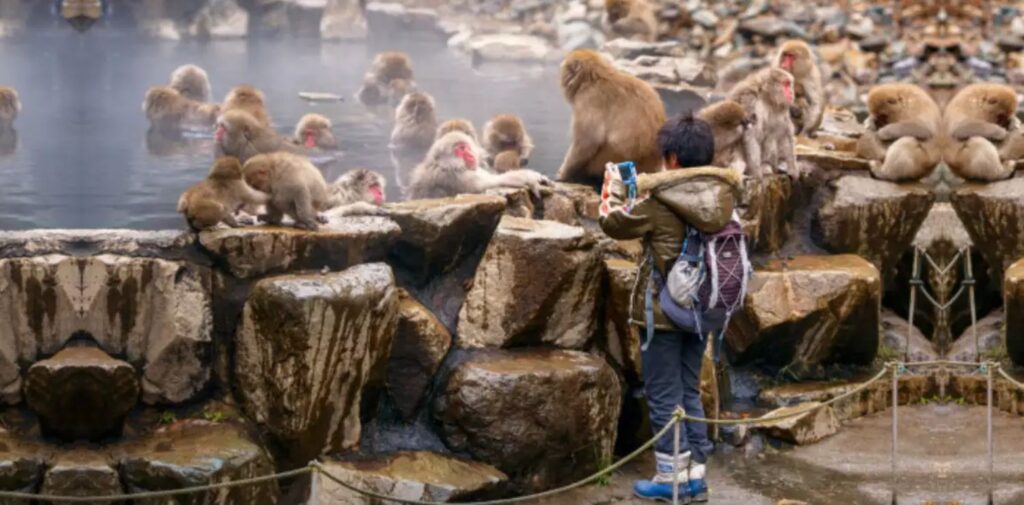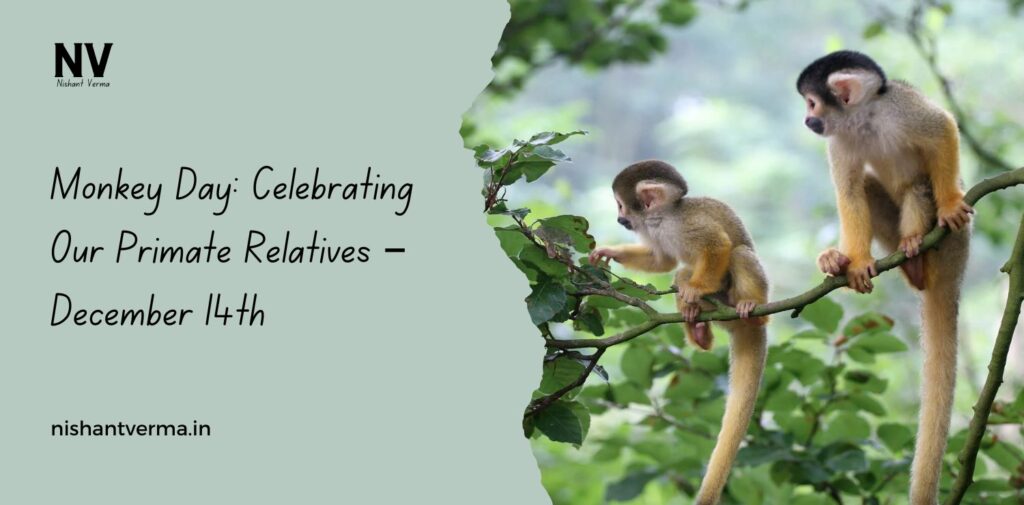Every year on December 14th, people around the world celebrate Monkey Day. While the idea of dedicating a day to monkeys might seem unusual at first, it’s a fun and meaningful way to raise awareness about these incredible creatures. In India, where monkeys are often seen in temples, urban areas, and forests, this day offers a unique opportunity to reflect on their importance in both our culture and the environment.
What is Monkey Day?
Monkey Day is an annual observance that started in 2000. It was originally created by National Lampoon’s cartoonist and artist, Blake Bradford, as a way to raise awareness about monkeys and other primates. Over time, the day has grown in popularity, with people around the globe celebrating it in different ways. The primary goal of Monkey Day is to highlight the importance of monkeys, promote conservation efforts, and remind people about the need to protect these animals.
In simple terms, it’s a day to celebrate monkeys, raise awareness about their conservation, and appreciate the role they play in our ecosystems. This day also serves as a fun reminder of the connection between humans and monkeys, our close evolutionary relatives. So, let’s dive into why Monkey Day is so relevant to us in India and how we can observe it meaningfully.

The Role of Monkeys in Indian Culture
In India, monkeys are more than just animals; they hold deep cultural and religious significance. The monkey god Hanuman, one of the most beloved deities in Hinduism, is a symbol of strength, devotion, and loyalty. Hanuman is considered a protector and is revered across the country. Many temples, especially in North India, feature monkeys as a part of the religious experience. Visitors might even find monkeys roaming around temples or sacred sites, making them a familiar part of the landscape.
Besides religious significance, monkeys have also been part of folklore, stories, and even everyday life. In several Indian cities, monkeys are seen in urban areas, especially in temples, parks, and even marketplaces. They are known for their playful behavior, quick movements, and their natural ability to adapt to human environments.
However, as much as monkeys are loved and revered, it’s also essential to consider the challenges they face. Over the years, urbanization and deforestation have put pressure on monkey populations, leading to conflicts between humans and monkeys. On Monkey Day, we can focus on understanding these challenges and explore ways to create a peaceful coexistence between humans and monkeys.
Why Celebrate Monkey Day in India?
Monkeys play an important ecological role in India’s diverse landscapes. From the Himalayan region to the southern parts of the country, monkeys help maintain the balance in their environments by dispersing seeds, controlling insect populations, and even helping in pollination. They are part of a complex ecosystem that relies on a balanced food chain.
But beyond their environmental role, Monkey Day is an opportunity for people in India to reflect on the broader issues of wildlife conservation. Here are some of the reasons why this day is especially important in the Indian context:
- Raising Awareness about Conservation: India is home to a variety of monkey species, including the Rhesus macaque, Langur, and Assamese macaque, to name a few. However, some of these species are under threat due to habitat destruction, illegal hunting, and human-wildlife conflicts. Celebrating Monkey Day helps raise awareness about these issues and encourages efforts for their protection. Many monkeys live in forested areas that are rapidly being replaced by cities, making it difficult for them to survive. Deforestation, urban sprawl, and the destruction of natural habitats have caused many monkeys to move into cities where they encounter human settlements. These changes often lead to conflicts, as monkeys search for food or become involved in accidents.
- Understanding Human-Monkey Relationships: Monkeys have an interesting relationship with humans in India. While some people admire them, others view them as pests, especially in urban areas where they may steal food or create chaos. On Monkey Day, it’s important to understand both sides of the issue. Instead of viewing monkeys as nuisances, we can take this day as an opportunity to learn more about their behavior, needs, and how we can co-exist peacefully with them. Monkeys are highly intelligent and social animals. They live in groups, communicate with each other, and often display behavior that mirrors human actions. For instance, monkeys can form social bonds, show empathy, and even engage in play, making them fascinating creatures to study and learn from.
- Promoting Monkey-Friendly Policies: Many conservation organizations and wildlife experts urge the Indian government to implement policies that ensure the protection of monkeys and their habitats. On Monkey Day, we can all do our part to support these efforts by advocating for better protection of wildlife and spreading awareness about the importance of preserving biodiversity. Whether it’s supporting local wildlife protection organizations or urging local governments to take action, every small step counts.
- Learning from Nature: Monkeys, like other animals, teach us valuable lessons about adaptation, social behavior, and even environmental sustainability. For example, they are known for their ability to adapt to changing environments, whether it’s living in dense forests or urban areas. By studying monkeys, scientists have gained important insights into human evolution, behavior, and intelligence. Monkey Day is an excellent time to appreciate how much we can learn from our primate cousins.

How Can We Celebrate Monkey Day in India?
Now that we understand why Monkey Day is important, let’s look at some fun and meaningful ways to celebrate it in India:
- Visit a Monkey Sanctuary or National Park: India is home to several national parks and wildlife sanctuaries where monkeys and other wildlife are protected. On Monkey Day, consider visiting one of these parks to observe monkeys in their natural habitats. Not only will you learn about their behavior and role in the ecosystem, but you’ll also have a chance to contribute to the conservation efforts.
- Educate Yourself and Others: Take some time to read more about the different species of monkeys found in India. Learn about their habitats, diet, social structure, and challenges they face in the modern world. Share this knowledge with your friends and family, especially children, to encourage them to respect wildlife. Social media can also be a great platform to spread awareness, so consider sharing interesting facts about monkeys and their conservation.
- Support Wildlife Organizations: There are many non-governmental organizations (NGOs) in India dedicated to protecting wildlife, including monkeys. On Monkey Day, consider donating to these organizations or volunteering your time to support their conservation efforts. Even small contributions can make a big difference in the lives of endangered animals.
- Celebrate with Fun Monkey-Themed Activities: For a lighter approach to celebrating Monkey Day, consider organizing fun activities like a monkey-themed art contest, cooking a dish inspired by monkeys, or having a nature walk to observe wildlife. Schools and community centers can host educational events to teach children about the importance of monkeys and other wildlife species.
- Support Ethical Tourism: If you plan on traveling to places known for their monkey populations, make sure to support ethical tourism practices. Avoid feeding or interacting with monkeys in ways that could harm their natural behaviors. Instead, enjoy observing them from a distance in their natural habitats.

Conclusion: Embracing Our Primate Relatives
Monkey Day is more than just a fun celebration. It’s a day to recognize the importance of monkeys in our world, understand their struggles, and learn how we can live in harmony with them. In India, where monkeys are such a prominent part of both our culture and environment, this day offers an opportunity to reflect on the deep connections we share with these intelligent and social creatures.
By celebrating Monkey Day, we not only show our appreciation for monkeys but also contribute to their protection and conservation. Whether it’s through education, supporting wildlife organizations, or simply observing monkeys in their natural habitats, every action helps ensure that these fascinating creatures continue to thrive for generations to come.
So, this December 14th, let’s take a moment to celebrate the playful, curious, and intelligent monkeys that share our planet, and honor the role they play in maintaining the balance of nature.




